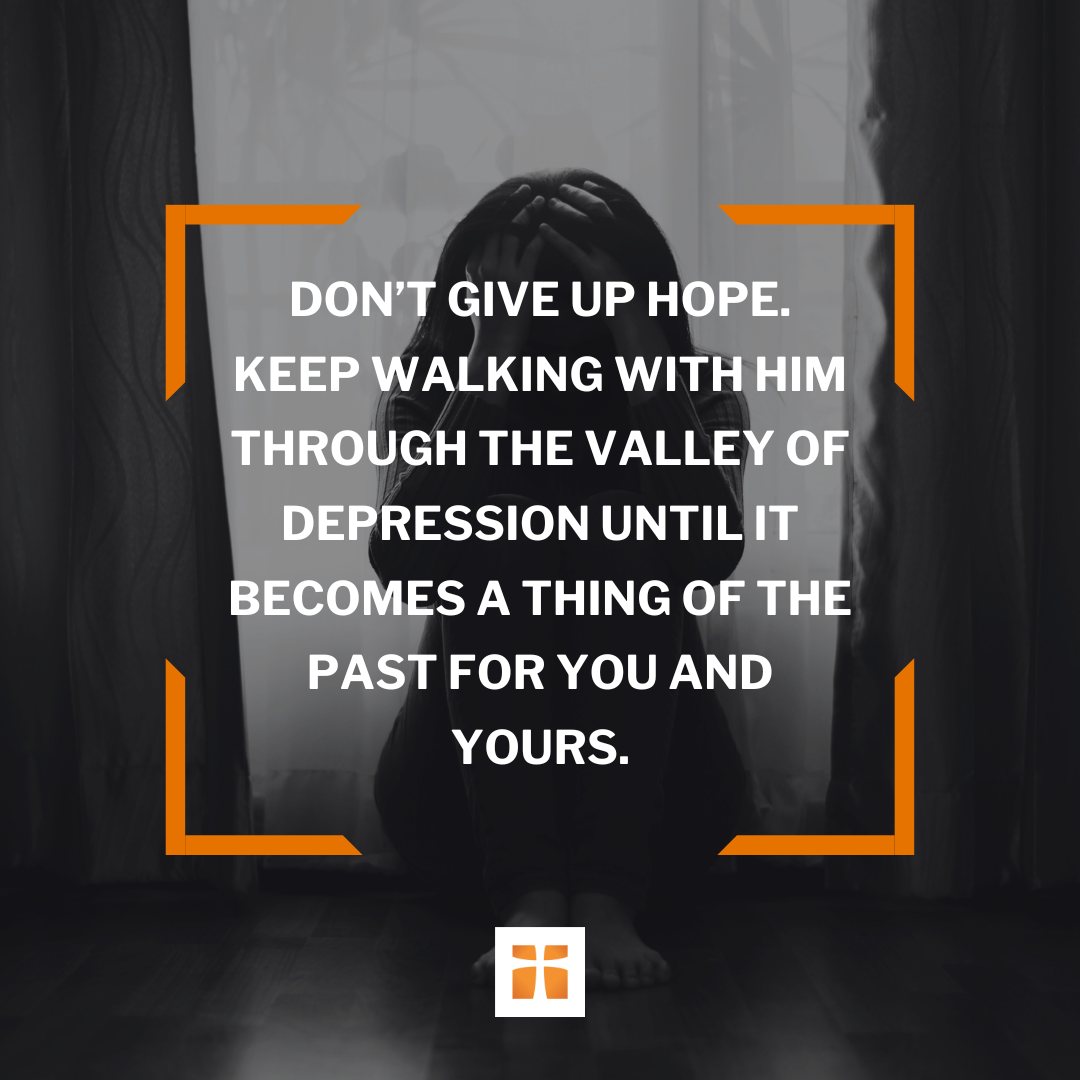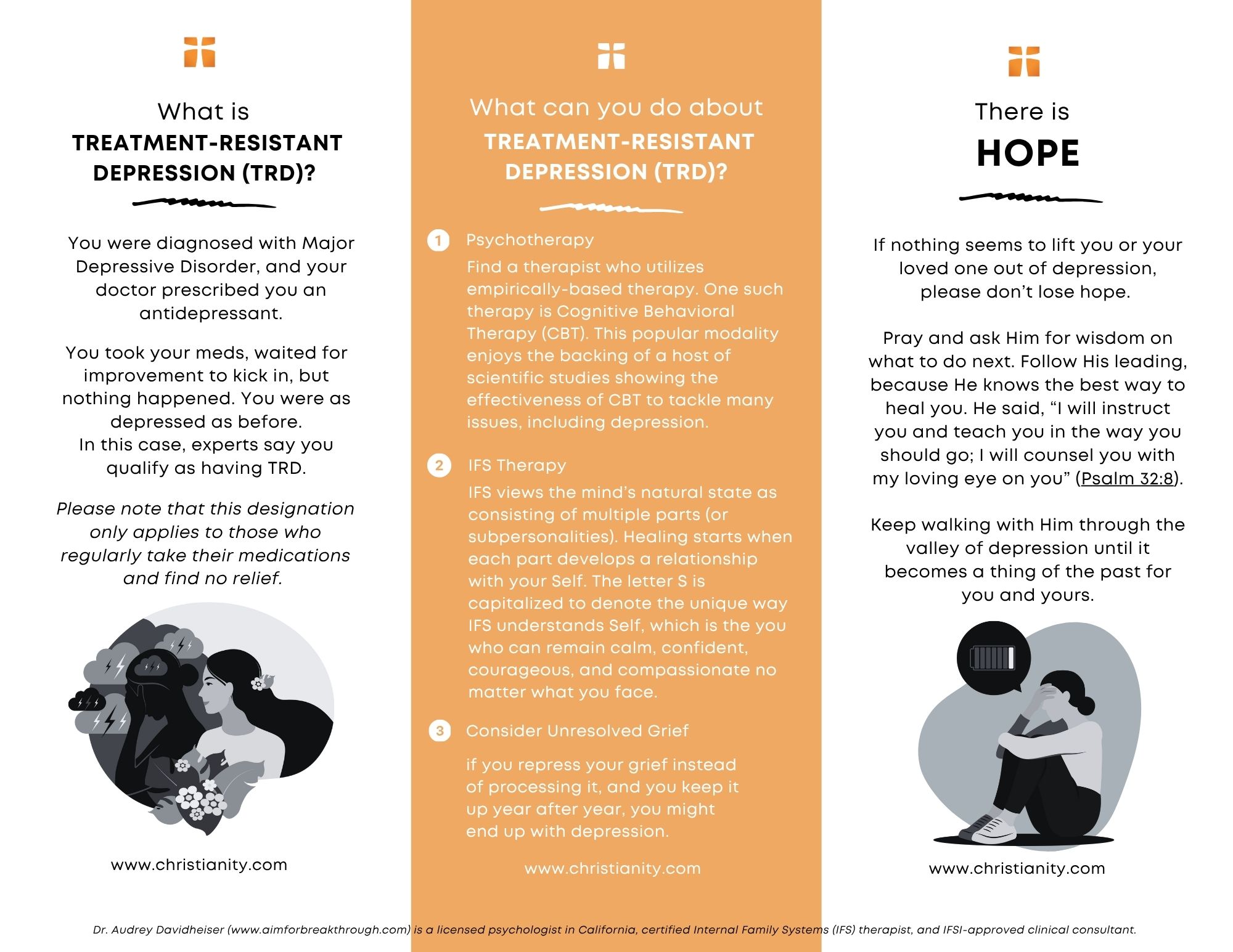A Biblical Path through Treatment-Resistant Depression

What Is Treatment-Resistant Depression (TRD)?
Although a consensus is lacking, the most common definition—including the one that the US Food and Drug Administration (FDA) adopted—is depression that doesn’t relent after two different antidepressant medications.
Let’s break down what it means.
Say you were diagnosed with Major Depressive Disorder and your doctor prescribed you an antidepressant. You took the right dosage, every day, giving the meds plenty of time to circulate in your system. However, eight weeks flew by, and you failed to see much difference. So, you went back to your doctor. This time, the MD prescribed you a different antidepressant, and you repeated the entire process. You took your meds, waited for improvement to kick in, but nothing happened. You were as depressed as before.
In this case, experts say you qualify as having TRD.
Please note that this designation only applies to those who regularly take their medications and find no relief. Psychotropic medications like antidepressants are notorious for their serious side effects. So, some patients intentionally skip their meds. Or they might have taken their pills routinely at first, but once the side effects emerged, they discontinued their meds—or reduced their doses willy-nilly.
If their depressive symptoms remain, these don’t qualify as having TRD because they didn’t give their meds an honest shot.
3 Things You Can Do about Treatment-Resistant Depression
Fitting the criteria of TRD is no reason to give up. Just because your depression seems impervious to treatment doesn’t mean you’re doomed to co-exist with it forever. For one thing, there’s a God in heaven who can heal not just physical infirmities, but also emotional maladies. Is there anything too hard for God (Genesis 18:14, Jeremiah 32:27)? The answer is a definite no. There isn’t any condition on earth that could paralyze our God into non-action.
Here are, therefore, a few options for your consideration.
1. Psychotherapy
The definition we covered above specifies the failure of two antidepressant trials to resolve depression. What seems to be bleak news actually leaves us with a lot of hope, because psychotherapy hasn’t entered the chat, so to speak. Both the American Psychiatric Association and American Psychological Association include psychotherapy as a “first-line intervention” in the practice guidelines for treatment of depression.
Both of these organizations have accumulated a tremendous amount of information when it comes to mental illness and its treatment. Therefore, if both promote psychotherapy as the standard of care for depression, we should esteem their recommendation.
What does it mean? Simply, you need to find a therapist. Even major depression cases can be helped with the joint effort of therapy and antidepressants.
But there’s a catch. Psychotherapy modalities are not created equal. Throughout history, there have been thinkers and clinicians who created their own theories within psychology, which resulted in many modalities of psychotherapy with differing levels of effectiveness. Some of these theories focus on changing the way we think, while others aim to access our unconscious mind. Still other modalities work with our emotions. Some therapy modalities are sensitive to the client’s trauma history, while others are not so much.
For optimal results, find a therapist who utilizes empirically-based therapy. One such therapy is Cognitive Behavioral Therapy (CBT). This popular modality enjoys the backing of a host of scientific studies showing the effectiveness of CBT to tackle many issues, including depression.
2. IFS Therapy
As popular as CBT is, there’s a caveat. Depression can be about poor thought patterns, something that CBT addresses brilliantly. But because emotional suppressions can also lead to depression, treatment has to involve the emotional world as well.
Enter Internal Family Systems (IFS) therapy. Since it’s a relatively newer model, there isn’t as much research backing up IFS compared to CBT. Still, the efficacy of IFS is boosting its worldwide acceptance. Studies are starting to show its power to help troubled clients, including depressed ones (click here and here, for instance).
IFS views the mind’s natural state as consisting of multiple parts (or subpersonalities). Healing starts when each part develops a relationship with your Self. The letter S is capitalized to denote the unique way IFS understands Self, which is the you who can remain calm, confident, courageous, and compassionate no matter what you face.
From a Christian perspective, your Self is synonymous with what the Bible calls your spirit. Since the Spirit of God resides in your spirit (Romans 8:16, Galatians 4:6), it makes sense for healing to begin when each of your parts develops a friendship with your spirit. The One who created us also indwells our spirit; it’s from our spirit that He spreads His healing power for the rest of our body.
I’ve been practicing as a licensed psychologist for 16 years and counting—the last six years as a certified IFS therapist. I can wholeheartedly ascertain the superiority of IFS, at least compared to the theories I used to practice before.
3. Consider Unresolved Grief
According to one study, depression can result from grief—a specific type called disenfranchised grief. This is grief that has been disowned because of one reason or another.
For instance, think of a woman who has just buried her husband. The problem is she descended from a family in which everyone is expected to remain stoic in the face of loss. Whenever there’s a family get-together, therefore, she feels forced to don a strong façade and answer every “how are you?” with a curt “I’m fine,” regardless of her inward hurt. In this fictitious example, the widow’s grief of losing her husband was disenfranchised.
But if you repress your grief instead of processing it, and you keep it up year after year, you might end up with depression.
The story doesn’t need to end there. There’s hope for even those of us who have been disenfranchised by our grief. If this describes you, find a therapist who uses an effective therapy modality—someone you feel connected to—and begin to process your grief. Don’t be surprised if your depression fades away over time.

What about Ketamine?
Indeed, ketamine has been found to alleviate TRD. But the ones who synthesized ketamine in 1962 didn’t do so to alleviate depression. They created the substance to serve as an anesthetic and analgesic.
Some have resorted to ketamine to cure depression because it’s fast-acting. Typical antidepressants take weeks to affect the user, whereas one dose of ketamine can deliver relief within hours or days. However, its effects seem to also fade faster than Zoloft or Prozac.
Is ketamine safe to take? The scientific community acknowledges the need for ongoing research to better understand the long-term impact of ketamine on the body. According to one doctor, ”there’s lots of evidence that ketamine is toxic to neurons, and it’s toxic in a dose- and duration-dependent fashion.” That is, the more you inject ketamine into your system, the more toxins you’re also accumulating.
Let’s not forget that ketamine is also considered psychedelic. Ingesting the substance can unleash all kinds of mind-altering experiences, including hallucinations. Some, like actor Matthew Perry, have also abused the substance, which can lead to tragic consequences.
Best practices call for using ketamine only under the supervision of a medical professional or a specifically trained therapist.
If nothing seems to lift you or your loved one out of depression, please don’t lose hope. Don’t think up ways to end your life. Mimic the widow in Luke 18 instead: she pleaded her case in front of a judge again and again (and again). If the judge—who neither feared God nor cared what people thought (Luke 18:2)—gave in to what the widow wanted, how much more would God the Father do the same for His children?
Pray and ask Him for wisdom on what to do next. Follow His leading, because He knows the best way to heal you. He said, “I will instruct you and teach you in the way you should go; I will counsel you with my loving eye on you” (Psalm 32:8).
Keep walking with Him through the valley of depression until it becomes a thing of the past for you and yours.
Amen.
Photo Credit: ©Unsplash/Fernando


Originally published October 05, 2025.





